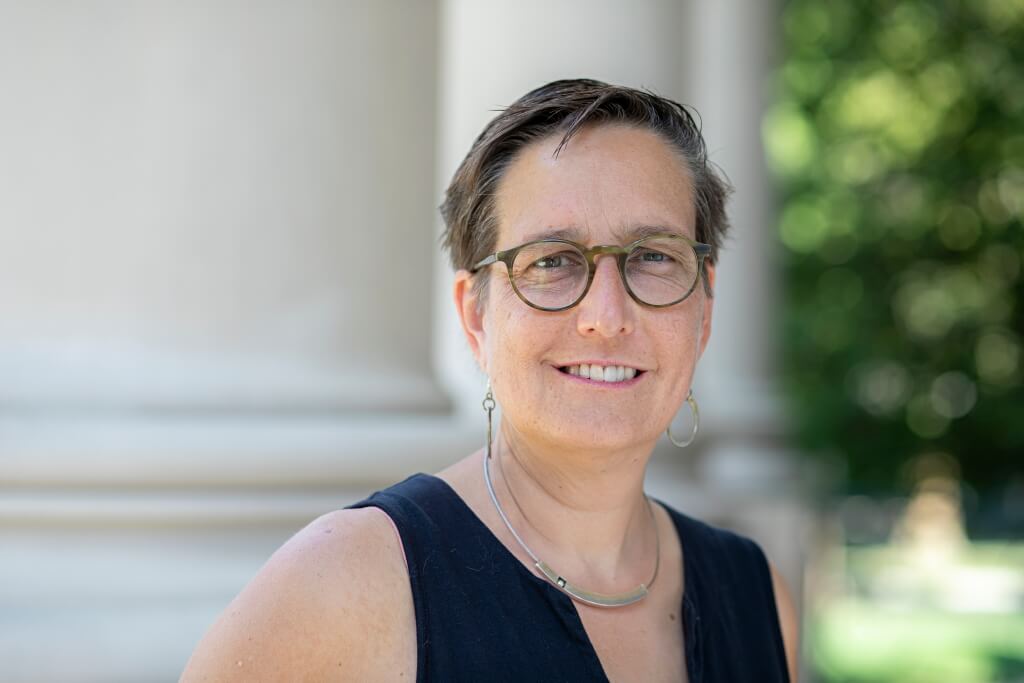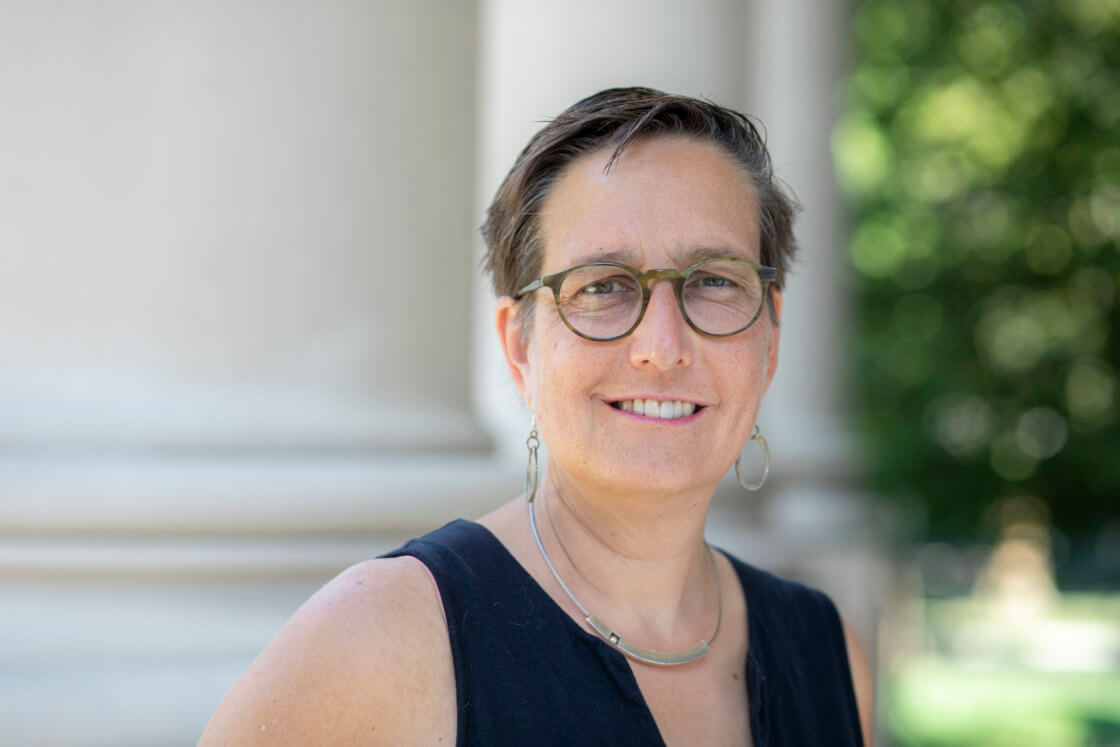
Heide Estes, Ph.D.
- Professor
- Graduate Faculty
Department: English
Office: The Great Hall Annex 508
Phone: 732-571-7547
Email: hestes@monmouth.edu
Heide Estes is Professor of English at Monmouth University, where she regularly teaches medieval literature, ecocriticism, and history of the English language. Her books include Anglo-Saxon Literary Landscapes: Ecotheory and the Environmental Imagination (Amsterdam University Press, 2017) and, with Nicole Guenther Discenza, Writing the World in Early Medieval England (Cambridge University Press, forthcoming). She is the founding director of the scholarly group Medieval Ecocriticisms and editor, with Ilse Schweitzer VanDonkelaar and Michael J. Warren, of the journal Medieval Ecocriticisms, published by Medieval Institute Publications/De Gruyter; volume 1 was published in 2021. She serves on the Modern Language Association’s Old English Forum and on the Inclusion and Diversity Committee of the Medieval Academy of America. Dr. Estes is currently on sabbatical and, from October 2022 through January 2023 is in residence at the University of Bonn, Germany.
Education
Ph.D., New York University
B.A., University of Pennsylvania
Research Interests
Old and Middle English literature, language and culture; ecocriticism; gender and sexuality; disability; Hebrew and Judaic studies.
Books
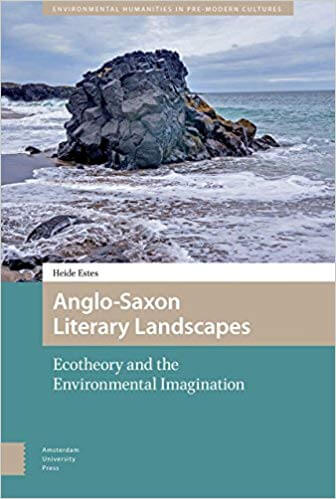
Anglo-Saxon Literary Landscapes: Ecotheory and the Anglo-Saxon Environmental Imagination. Amsterdam University Press, 2017.
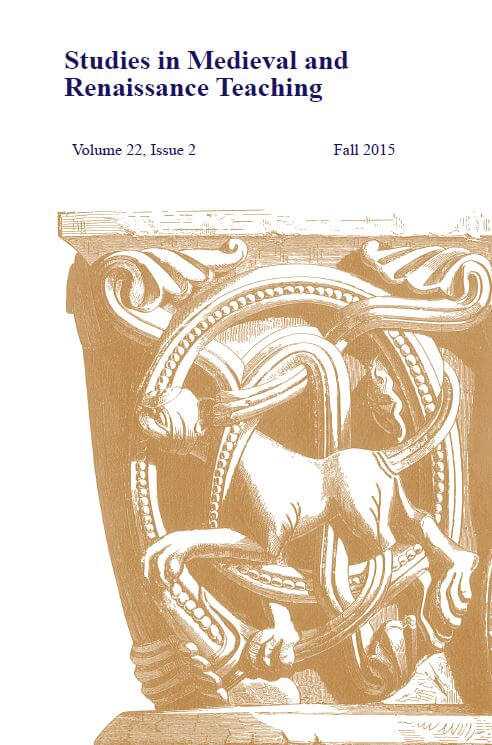
Old English Across the Curriculum: Contexts and Pedagogies. Ed. Hal Momma and Heide Estes. Special issue of Studies in Medieval and Renaissance Teaching. Vol 22, no. 2. Fall 2015.
Journals
Medieval Ecocriticisms
An annual journal covering a wide and inclusive spectrum of approaches and methods in interdisciplinary ecocritical studies, including ecofeminism and new ecocritical analyses of under-represented literatures; queer ecologies; posthumanism; waste studies; landscape studies; maritime studies and blue humanities; studies of environmental catastrophe and change and their effects on pre-modern cultures; and more traditional approaches that, nonetheless, are concerned with the ecological and environmental in some way. We are actively seeking submissions in literary and cultural studies, philosophy, environmental history, art history, environmental archaeology, zooarchaeology, and other disciplines in the humanities.
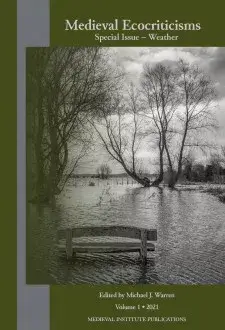
Vol. 1, 2021
Vol 2, Forthcoming
View Medieval Ecocriticisms Facebook group: https://www.facebook.com/groups/medieval.ecocriticisms
View Medieval Ecocriticisms Facebook page: https://www.facebook.com/MedievalEcocriticisms/
View Medieval Ecocriticisms blog: https://medievalecocrits.wordpress.com/
Scholarly Articles
“Weather and the Creation of the Human in the Exeter Book Riddles.” Medieval Weathers, ed. Michael J. Warren. Medieval Ecocriticisms 1 (2021): 11-29.
“Environment, Landscape and Nature in the Merchant’s Tale.” The Open Access Companion to the Canterbury Tales. Edited by Candace Barrington, et al. 2020.
“Menstruation, Infirmity, Religious Observance” (Book I, from Chapter 27, Question 8) and “The Miracles of King Oswald” (Book III, Chapters 7, 8), edited and translated entries with introductions for Medieval Disability Sourcebook, ed. Cameron Hunt McNabb. Punctum Books, 2020. Pages 315-320.
“Boundaries Embodied: An Ecofeminist Reading of the Old English Judith.” New Readings on Women and Early Medieval English Literature and Culture, ed. Helene Scheck and Christine Kozikowski. ARC Humanities Press, 2019. 179-190.
“Reading Ælfric in the Twelfth Century: Anti-Judaic Doctrine Becomes Anti-Judaic Rhetoric.” Imagining the Jew in Anglo-Saxon Literature and Culture, ed. Samantha Zacher. University of Toronto Press, 2016: 265-297.
“Teaching Old English in History of the English Language.” In Old English Across the Curriculum: Contexts and Pedagogies, ed. Haruko Momma and Heide Estes. Special Issue, Studies in Medieval and Renaissance Teaching 22.2 (Fall 2016): 25-29.
“Beowulf and the Sea: An Ecofeminist Reading.” The Maritime World of the Anglo-Saxons, ed. Bill Schipper, Stacy Klein, and Shannon Lewis-Simpson (Essays in Anglo-Saxon Studies 5). Tempe: Arizona Center for Medieval and Renaissance Studies, 2015: 209-216.
“Constructing the Old English Solomon and Saturn Dialogues.” English Studies 95.5 (July 2014): 483-499.
“Blogging and Academic Identity.” Literature Compass: E-medieval: Teaching, Research, and the Net 9.12 (December 2012): 974-982.
“Anglo-Saxon Biblical Lore: An Edition.” English Studies 93:6 (October 2012): 623-651.
“Raising Cain in Genesis and Beowulf: Challenges to Generic Boundaries in Anglo-Saxon Biblical Literature.” Heroic Age 13 (August 2010), unpaginated.
“Wonders and Wisdom: Anglo-Saxons and the East.” English Studies 91.4 (June 2010): 360 – 373.
“A Note on Solomon and Saturn I, lines 107b – 108a.” Notes and Queries 55: 3 (September 2008): 260 – 262.
“Abraham and the Northmen in Genesis A: Alfredian Translations and Ninth-Century Politics.” Medievalia et Humanistica 32 (2007): 1 – 13.
“Colonization and Conversion in Cynewulf’s Elene.” Conversion and Colonization in Anglo-Saxon England. Ed. Catherine Karkov and Nicholas Howe. Essays in Anglo-Saxon Studies 2. Tempe: Arizona Center for Medieval and Renaissance Studies, 2006. 133 – 151
“Feasting with Holofernes: Digesting Judith in Anglo-Saxon England.” Exemplaria 15.2 (Fall 2003): 325 – 350.
“Bertilak Reads Brut: History and the Complications of Sexuality in Sir Gawain and the Green Knight.” Essays in Medieval Studies 17 (2001): 65 – 79.
Multimedia
Monmouth Now
- Professor Estes Keynotes European Conference, July 2021.
- Professor Estes Elected to MLA Forum Executive Committee, Jan. 2021.
- Estes’ Book Lauded by Oxford Academic Journal, April 2020
- Estes delivers Keynote Lecture at UMass Conference, Feb. 2020.
- Professor Heide Estes Delivers Lecture on the Climate Crisis, Jan. 2020.
- Medieval Literature Professor and Evolutionary Biologist Join Forces to Teach ‘Humans and the Environment’ Course, April 2019.
- Professor Heide Estes’ Book Receives Positive Reviews, Feb. 2019.
- Wealhtheow by Women: Estes Presents Research at Texas A&M University, Jan. 2019.
- English Professor Heide Estes Speaks at Symposium in Northern Ireland, Nov. 2018.
Presentations/Invited Talks
“Jews, Gender, and Disability in Old English Poetry.” Colloquium for Early Medieval Studies, Columbia University. May 2022.
“Ecocriticism, Disability, and the Beowulf Manuscript.” University of Rochester, April 2022. Virtual.
“Landscape as History: Disability, Ecocriticism, and Early Medieval Monsters.” Shifting Landscapes of the Medieval World, Seminar, Centre for Research in the Arts, Social Sciences and Humanities, University of Cambridge. February 2022. Virtual.
“Writing the World.” New York University. November 2021.
“What Is A Book?” Ursinus College. November 2021. Virtual
“Climate Then, Crisis Now: Medieval Ecocriticisms and Environmental Activism.” Keynote lecture. International Medieval Congress, University of Leeds, July 2021. Virtual.
“Why Ecocriticism Matters.” The Public Role of the Humanities, University of Bristol, May 2021. Virtual.
“Jews, Gender, and Disability in Old English Poetry.” Medieval and Renaissance Seminar, University of Pennsylvania, April 2021. Virtual.
Ecocriticism in Premodern Studies, Medieval and Renaissance Studies Works-In-Progress Seminar, University of Missouri. Virtual. April 2021. Virtual.
“Save the World!” FlexFridays, Flex School, Berkeley Heights, NJ, January 2021. Virtual.
“Disability, Gender, and Jews: Masculinity in the Old English Andreas and Genesis.” The Colloquium for Early Medieval Studies, Columbia University, March 2020.
“What Can We Do?” Public talk on environmental engagement, Church of St. Anselm, Tinton Falls, NJ, January 2020.
“Embodied Ecocriticisms: Disability, Gender, and Medieval English Literature.” Appalachian State University, November 2019.
“Gender, Jews, and Disability in Old English Poetry.” Harvard Medieval Colloquium, Harvard University, October 24, 2019.
“Interdisciplinary Team Teaching to Improve Student Engagement.” With C. N. Duckett. SENCER Regional Conference, The New School, April 2019.
“Weather and the Creation of the Human in the Exeter Book Riddles,” Keynote lecture, Medieval Weathers, King’s College London, July 7, 2018.
“Beowulf and the Sea,” Plenary lecture, Undergraduate Conference in Medieval and Early Modern Studies, Moravian College, December 3, 2016.
“‘An Enemy Robbed Me of Life’: Voices of Nature in Old English Poetry,” Clare Hall Colloquium, June 5, 2015. Podcasted.
“Ruined Landscapes in Old English Poetry,” Department of Anglo-Saxon, Norse and Celtic, University of Cambridge, May 11, 2015.
“Riddling Things: Anglo-Saxon Meets Ecocriticism,” Medieval English Research Seminar, Faculty of English Language and Literature, University of Oxford, February 2015.
“Anglo-Saxon Riddles, Talking Animals, and Ecocriticism,” Medieval Reading Group, Faculty of English, University of Cambridge, January 2015.
“‘Stige nearwe, enge anpaðas’: Landscape and Ecology in Beowulf.” Anglo-Saxon Studies Colloquium, Columbia University, October 2007.
“Eco-Criticism and Anglo-Saxon Landscape.” Graduate Seminar Lecture Series, Department of Anglo-Saxon, Norse and Celtic, University of Cambridge, May 2007.
Forthcoming
Nicole Guenther Discenza and Heide Estes, Writing the World in Early Medieval England. Cambridge University Press.
The Old English Solomon and Saturn Dialogues. Digital edition of poetic and prose texts from manuscripts from the 9th through 12th centuries. Old English Poetry in Facsimile.
Gender, Disability and Jews in Old English Poetry: Intersections. Amsterdam University Press.
Medieval Ecocriticisms: Animals, Landscapes, Objects, and the Nature of the Human. Ed. Heide Estes. Medieval Institute Publications/De Gruyter.
Additional Information
SERVICE:
Modern Language Association’s Old English Forum
Medieval Academy of America’s Inclusion and Diversity Committee
Courses
Recently Taught Classes
2022 Spring
- Environment and Pre-Modern Literature – EN 211
2021 Fall
2021 Spring
Frequently Taught Classes
- Chaucer (EN 405, EN 409)
- College Composition II (EN 102)
- College English II (EN 102)
- Cooperative Education: English (EN 388)
- Environment and Pre-Modern Literature (EN 211)
- History of the English Language (EN 443, EN 466)
- Introduction to Gender Studies (GS 225, SO 225)
- Linguistics and the English Language (EN 563)
- Literature I: Ancient Through Renaissance (EN 201)
- Middle English Literature (EN 509)

